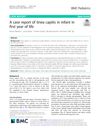 10 citations,
February 2019 in “BMC pediatrics”
10 citations,
February 2019 in “BMC pediatrics” An infant with scalp fungus was cured after extended treatment with antifungal medication.
2 citations,
December 2019 in “Chinese medical journal/Chinese Medical Journal” A woman with a scalp infection and herpes recovered fully after treatment.
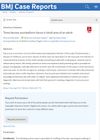 September 2024 in “BMJ Case Reports”
September 2024 in “BMJ Case Reports” An adult had a rare scalp infection in the forehead area, treated successfully with itraconazole.
 August 2022 in “Case reports”
August 2022 in “Case reports” Isotretinoin effectively treated a rare scalp condition, but careful drug monitoring and a dairy-free diet were important.
 112 citations,
July 2008 in “Dermatologic Therapy”
112 citations,
July 2008 in “Dermatologic Therapy” Folliculitis decalvans is a rare scalp condition causing scarring hair loss, treated with long-term antibiotics and other medications, but it often comes back and is hard to manage.
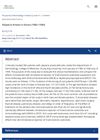 46 citations,
November 1995 in “The Journal of Dermatology”
46 citations,
November 1995 in “The Journal of Dermatology” Alopecia areata was most common in people in their 30s and 40s, with some family history and a higher relapse rate, and larger bald areas responded better to specific immunotherapy.
37 citations,
September 2009 in “JEADV. Journal of the European Academy of Dermatology and Venereology/Journal of the European Academy of Dermatology and Venereology” Diphencyprone (DPC) is an effective and safe long-term treatment for alopecia areata, especially with maintenance therapy.
1 citations,
January 2021 in “Skin appendage disorders” Alopecia areata in children is usually mild and effectively treated with strong topical steroids.
 September 2023 in “SKIN The Journal of Cutaneous Medicine”
September 2023 in “SKIN The Journal of Cutaneous Medicine” Talquetamab may cause hair loss and skin issues.
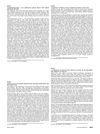 2 citations,
February 2009 in “Journal of the American Academy of Dermatology”
2 citations,
February 2009 in “Journal of the American Academy of Dermatology” Injecting triamcinolone into the eyebrow area may help eyelash regrowth in alopecia areata patients.
1 citations,
April 2014 in “Journal of the American Geriatrics Society” Diagnosing mycosis fungoides, a rare skin cancer, is difficult in elderly adults and requires careful examination to avoid mistaking it for less serious skin conditions.
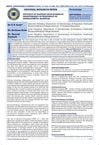 May 2023 in “PARIPEX INDIAN JOURNAL OF RESEARCH”
May 2023 in “PARIPEX INDIAN JOURNAL OF RESEARCH” Platelet-rich plasma is an effective and safe treatment for male pattern hair loss.
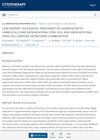 May 2024 in “Cytotherapy”
May 2024 in “Cytotherapy” Stem cell treatments led to complete hair regrowth in a 40-year-old man.
 January 2024 in “Elsevier eBooks”
January 2024 in “Elsevier eBooks” Increasing regulatory T cells may help treat alopecia areata by reducing autoimmunity and promoting hair growth.
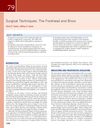 January 2017 in “Elsevier eBooks”
January 2017 in “Elsevier eBooks” The document concludes that choosing the right forehead and brow lifting technique based on individual patient characteristics is crucial to prevent complications and achieve desired results.
 17 citations,
January 2019 in “Dermatologic Therapy”
17 citations,
January 2019 in “Dermatologic Therapy” Tofacitinib is effective and safe for long-term treatment of severe alopecia areata, with many patients achieving complete hair regrowth.
 August 2023 in “Indian journal of pediatrics/Indian Journal of Pediatrics”
August 2023 in “Indian journal of pediatrics/Indian Journal of Pediatrics” Topical treatments helped a child with Down syndrome and severe hair loss regrow most of his hair.
 January 2023 in “Przegla̧d dermatologiczny”
January 2023 in “Przegla̧d dermatologiczny” There are two main types of alopecia areata with different severity, and diagnosis is made through clinical examination and trichoscopy, influencing treatment choices.
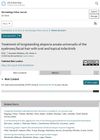 August 2022 in “Dermatology Online Journal”
August 2022 in “Dermatology Online Journal” Oral and topical tofacitinib can effectively treat severe hair loss with minimal side effects.
 August 2020 in “Ugeskrift for Læger”
August 2020 in “Ugeskrift for Læger” A man with severe hair loss regrew all his hair using tofacitinib and stayed healthy for a year.

Alopecia areata often starts around age 23, can be permanent in 30% of cases, and treatments are usually temporary.
24 citations,
March 2009 in “Archives of dermatological research” The combination of oral PUVA and corticosteroids helps regrow hair in severe alopecia areata.
 20 citations,
December 1997 in “Clinical Endocrinology”
20 citations,
December 1997 in “Clinical Endocrinology” Spironolactone may help reduce hair loss in androgenic alopecia.
 17 citations,
December 2001 in “Dermatologic therapy”
17 citations,
December 2001 in “Dermatologic therapy” Different treatments for alopecia areata have unpredictable results and varying success rates.
14 citations,
August 2014 in “Journal of the American Academy of Dermatology” Diphenylcyclopropenone (DPCP) is effective in treating alopecia areata, with most patients showing significant hair regrowth.
 4 citations,
December 1997 in “Clinical Endocrinology”
4 citations,
December 1997 in “Clinical Endocrinology” Spironolactone may help reduce hair loss in androgenic alopecia.

Topical calcipotriol successfully treated hair loss in three patients with Alopecia Totalis.
 January 2007 in “Elsevier eBooks”
January 2007 in “Elsevier eBooks” Alopecia areata is a reversible, autoimmune-related hair loss that can have significant emotional impact and uncertain treatment effectiveness.
 14 citations,
January 2014 in “Journal of Cutaneous and Aesthetic Surgery”
14 citations,
January 2014 in “Journal of Cutaneous and Aesthetic Surgery” Scalp Roller therapy helped improve hair growth in patients with hard-to-treat alopecia areata.
 4 citations,
January 2019 in “Dermatologic Therapy”
4 citations,
January 2019 in “Dermatologic Therapy” Scalp basal cell carcinoma may be more aggressive and harder to treat than other types, requiring special attention and further research.
























